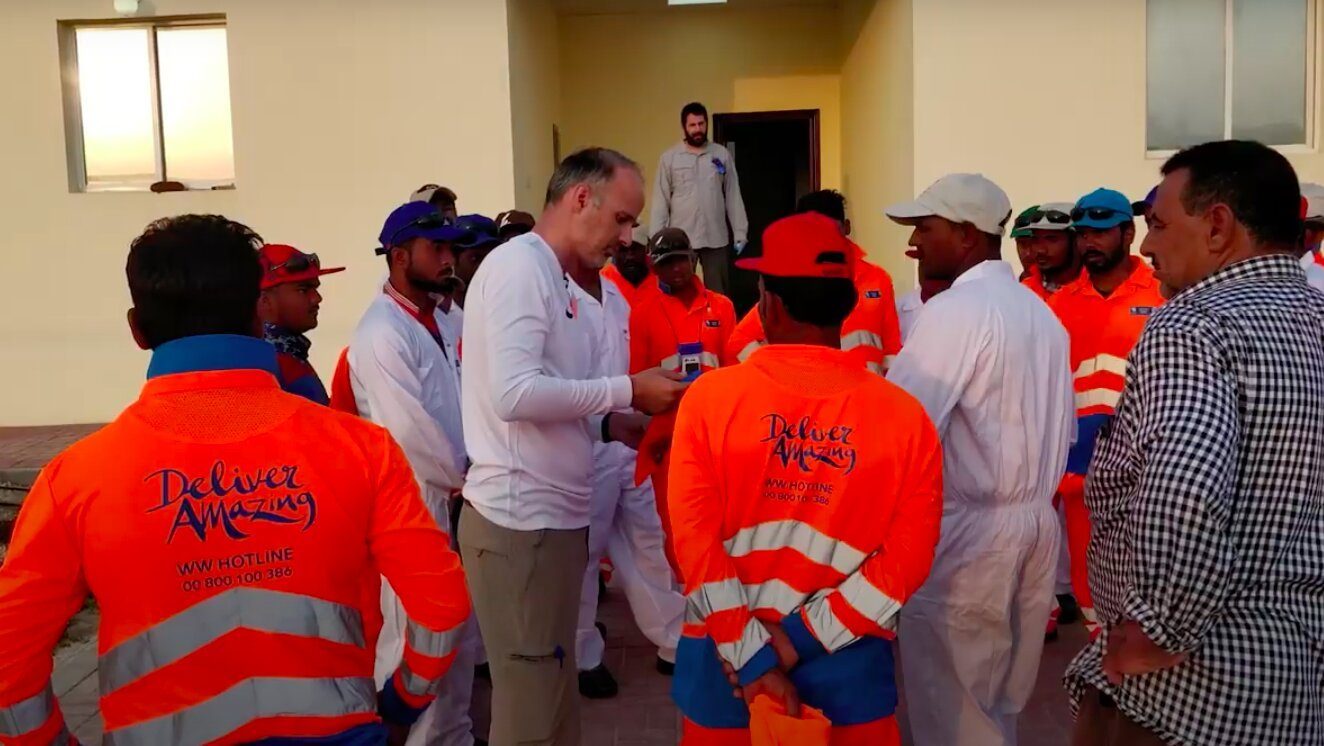The Gulf state says it is responding to calls for improvement by rights’ groups in the way work related deaths are documented in the country.
Qatar’s labour and health ministries signed an agreement on Wednesday aimed at cooperating on data collection to better address work-related injuries and deaths and help improve worksite safety.
A memorandum of understanding was signed between Minister of Labour Dr. Ali bin Saeed bin Smaikh Al Marri, who is also the former head of Qatar’s National Human Rights Committee and Minister of Public Health Dr. Hanan Mohamed Al Kuwari.
The UN’s International Labour Organization’s [ILO] office in Qatar welcomed the agreement, describing it as a “positive and important development”.
Very positive and important development👏 Greater collaboration between @MOLQtar and @MOPHQatar on data collection and analysis will better address existing challenges and prevent work-related injuries! https://t.co/qV4Qj2Z1tY
— ILO Qatar (@ILOQatar) November 24, 2021
Titled “One is Too Many”, the ILO’s study detailed work-related injuries and fatalities recorded in 2020 based on data gathered from major Qatar-based institutions.
It revealed that some 50 workers died in Qatar and over 500 were severely injured, whereas 37,600 suffered mild to moderate injuries. The ILO also called for more accurate data collection and investigations.
“We must move with urgency, as behind each statistic there is a worker and their family,” said the ILO on Friday.
Qatar’s labour ministry welcomed the ILO’s report and confirmed recommendations were being reviewed.
The Gulf state has come under international scrutiny since it won the bid to host the 2022 FIFA World Cup in 2010, with the majority of the criticism coming from Western media with what Doha has often described as bias and sensationalistic headlines.
Qatar has made ‘strong progress’ on human rights but more work needed
One such report was published by The Guardian in February this year headlined, “Revealed: 6,500 migrant workers have died in Qatar as it gears up for World Cup” in which it linked the “shocking” death rate to the start of the World Cup journey a decade ago.
However, the report failed to clarify the reasons behind the deaths and was also dismissed by Qatar as “baseless”.
More recently, The Guardian published another article titled “We have fallen into a trap’: Qatar’s World Cup dream is a nightmare for hotel staff”, in which it stated multiple allegations of breaches of Qatar’s labour law in the hospitality sector.
The accusations included low wages, long hours, and some remanence of the Kafala system, which was dismantled by the state last year.
As a response, Qatar’s media attache to the UK Fahad Al-Mana wrote a letter to the Guardian stating that the report fails to mention the country’s progress in improving living and working standards for foreign workers.
“Qatar has never shied away from acknowledging that its labour system is still a work in progress, but we expect reporting to present the facts as they stand,” he said.
Meanwhile, prominent figures and the international community have praised Qatar’s major steps regarding labour reform, which were achieved after authorities started working closely with the ILO.
Qatar is also the only country in the region to host an ILO office, a move that is seen as proof of Doha’s commitment to addressing concerns raised over rights abuses.
On Wednesday, the English Football Association chief executive Mark Bullingham said that Qatar has made “strong progress” on human rights while noting that more work needs to be done.
“The first point we always make is we are not perfect ourselves as a country and I think we have to establish that early on when we talk about any other country,” said Bullingham, adding that the visit has helped the group get an understanding of the legislation change over the past few years.
Among the major reforms Qatar made was the introduction of the region’s first ever non-discriminatory minimum wage, under which employers employers must pay allowances of at least QAR 300 for food and QAR 500 for housing on top of the minimum monthly basic wage of QAR 1,000.
Employers who pay their staff less than the minimum wage face one-year in jail and a QAR 10,000 fine.
Qatar also drastically enhanced monitoring across the board to detect violations, enacting swifter penalties and further strengthening the capacity of labour inspectors.
So far, dozens of companies have faced action from authorities for violating the new laws.
__________________________________________________________________







